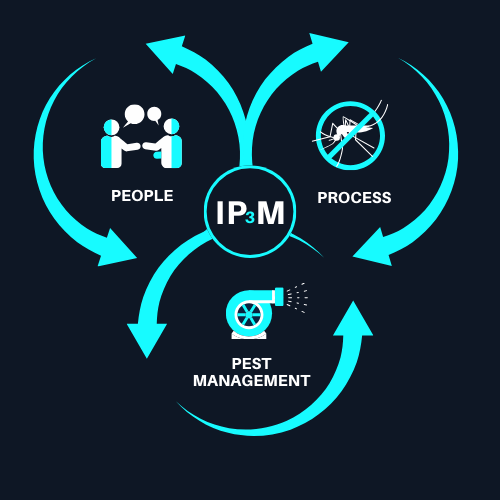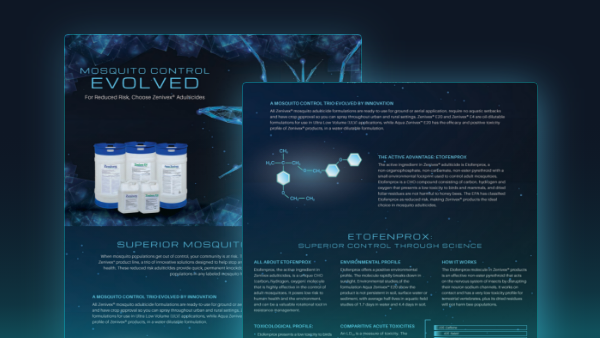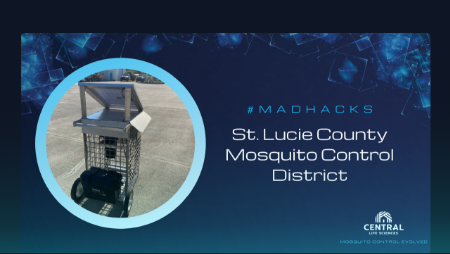TAKEAWAYS FROM AMCA
By Dan Killingsworth
It was wonderful to connect with so many mosquito control professionals during the AMCA annual meeting in Puerto Rico. This is the preeminent gathering for the public health mosquito management community. The conference was very well attended, and the high quality of in-depth scientific presentations was fascinating.
Central Life Sciences was at AMCA showcasing our newest venture, Central UAS Technologies, with our DropVision® software. It was inspiring to see so much excitement and interest in the potential of UAS technologies for vector control.
It had been 27 years since my last visit to Puerto Rico, and I was impressed at the vibrancy of the area. One of the greatest highlights of the conference was a field day with the Puerto Rico Vector Control Unit. They are a professional group that takes pride in their enormous outreach and awareness efforts. Dengue virus is a major challenge as the problematic mosquito Aedes aegypti continues to persist on the island. So much of their outreach efforts are door-to-door visits, with the goal of improving the public’s understanding of what generates mosquito issues in and around the home such as open cisterns and improperly discarded tires.
The AMCA rolled out a new outreach campaign of its own to help make mosquito-borne disease a thing of the past with the tagline, “Yesterday’s threat, today’s solutions.” With ever developing modern solutions for public health, such as the incorporation of drone technology, the vector management community will overcome the scourge of mosquitoes.
Overall, AMCA was filled with great conversations and insights about how we can all do our part to improve vector control across the communities we serve. The collaboration and enthusiasm surrounding the conference, along with new scientific insights, is one of the many reasons it is one of my favorite events to attend. I’m looking forward to the next meeting in Portland, Oregon in 2026.
Integrated Pest Management Overview: Part 1
By Dan Killingsworth
At its core, Integrated Pest Management (IPM) is a science-based, sustainable decision-making process that uses information and technology to manage pest issues. The success of an IPM program starts with strong communication and collaboration. It is important to understand the values of the decision makers burdened with the pest challenge. When do we take action?
The concept of IPM was developed in agriculture. Action thresholds are relatively straightforward concepts on a farm where the cost of treatments can be compared to the costs of a lost crop and a decision is made. The value system is much different for a community dealing with mosquitoes and mosquito-borne disease. What is the action threshold when human health is involved? How best to manage mosquito populations?
The obvious first step is to identify the pest species of concern. Next, it is critical to assess your limitations. Every management plan is defined by limitations. Are the areas where the mosquitoes are developing a continual source of mosquito activity? Can these areas be eliminated? If not, what restrictions exist for controlling new generations of mosquitoes?
There may be limitations to where you can treat, such as in conservation areas or setback regulations near water bodies. There may be limitations involving when you can treat based on pest behavior for peak activity periods. Treatment product labels and application equipment can also carry limitations or restrictions that impact treatments, such as the use of ultra-low volume products in high winds, or temperature inversions. And of course, budget constraints are a limitation in any mosquito management plan.
I have added an additional layer to the traditional IPM program. I call it IP3M, which stands for People, Process, and Pest Management. I have found that people and the everyday processes in our lives tend to promote any particular pest issue. By understanding who is instrumental in these processes, these same people can play an integral role in identifying and solving these pest control issues. Once the people and processes are aligned, it’s essential to lead with a plan, and not just a product.
A current example of people and processes coming together to form an integrated pest management plan occurred when we partnered with a local zoo that recently lost some exotic birds to West Nile virus. Not only that, but vector and nuisance mosquitoes were continually biting employees and visitors. We teamed up with the zoo to train them on surveillance for more effective management, and we donated some equipment to help those mosquito identification efforts.
We’re also working with them to establish target-specific treatment protocols for sensitive areas such as exotic animal zones and water bodies. All treatments are based on regular monitoring of mosquito population pressure to create an efficient and effective integrated mosquito management protocol.
Ultimately, most pest control problems can be handled with proper communication, observation, diligence, and an established plan based on monitoring and feedback.
Highlights from Our
Regional Experts
East Central Region
Gary Wagner
Larvicide resistance is a hot topic among the vector control community. A recent study conducted by the MMCA Scientific Committee along with Michigan State University’s Dr. Ned Walker found no larvicide resistance to Altosid® pellets. The study also found that Altosid® Pellets WSP provided 100% emergence inhibition over the four-week evaluation. It was a busy winter for Gary, as he recently presented at the Michigan Mosquito Control Association Annual Meeting, Michigan Pest Control Association Winter Meeting, the Wisconsin Pest Control Association Conference and the Ohio Pest Management Association Winter and Education Committee Meeting.
Gary also has a number of speaking engagements this spring, including at:
- OPMA Spring Training
- Kwik Kill Pest in Madison, Wisconsin
- Illinois Pest Control Association
Southeast Region
Mike Riles
Historic snowfall hit the region this winter, shutting down communities across the Gulf, southern Georgia and the Florida Panhandle. This uncharacteristically cold weather could have an impact on the start of mosquito season across these areas. Mike has been plenty busy despite the chilly weather, meeting with Miami-Dade County to discuss invasive mosquitoes and hosting a drone demo with Pasco County, Florida to provide more education on the capabilities of Central UAS Technologies.
Mike has also made several appearances this spring, including at:
- AMCD Arbovirus Surveillance & Mosquito Control Workshop in St. Augustine
- FMCA Fly-In Lee County, FL
- Northwest Regional Workshop, Mike gave a presentation about overwintering mosquitos.
Western Region
Samer Elkashef
During the MVCAC Annual Meeting in Oakland, Sacramento-Yolo presented findings from their trial using Altosid® Liquid Larvicide Concentrate (SR-20). The results showed that Altosid® Liquid SR-20 provided the same level of control as competitor alternatives for areawide larviciding in neighborhoods. Delta MVCD also presented a study they did using Altosid® Liquid Concentrate (SR-20) and found a significant difference in adult mosquito populations in areas treated with Altosid® Liquid Concentrate (SR-20) vs. areas that were not treated.
Northeast Region
Jenna Mora
Central Life Sciences would like to congratulate and thank Jeffrey O’Neill for his decades of dedicated service to the Northeast Region. His contributions to Central Life Sciences and the larger pest management and mosquito control communities have been truly invaluable. Central Life Sciences would also like to welcome and introduce Jenna Mora as our new Northeast Region sales rep.
West Central Region
Loren Cunnington
With mosquito season fast approaching, it’s officially go time with plenty of opportunities to get out in the field and reconnect with people. From presenting at the Montana Vector Control Association Conference in Great Falls, MT, to helping the West Central Mosquito and Vector Control board plan their upcoming conference in Jackson Hole, WY, now is the time to start preparations for the upcoming season.
Mid-Central Region
Jeromy Baumbach
Winter has served as a tremendous opportunity to get in front of customers before spring mosquito activity ramps up. Jeromy attended the Nebraska Urban Pest Control Conference in February and is planning to conduct Van Diest workshops promoting the effectiveness of UAS technology.
South Central Region
Gary Ross
February was another very cold month with a week of uncharacteristically low temps in the teens. The cold weather has kept mosquito activity low, with many mosquito control districts planning for larvicide applications to begin in March.
What's Your Vision?
We'd love to hear any feedback you had on this edition of Vector Vision, and any suggested topics you'd like to hear covered in future versions.
Share your Vector Vision with us in the form below.



















